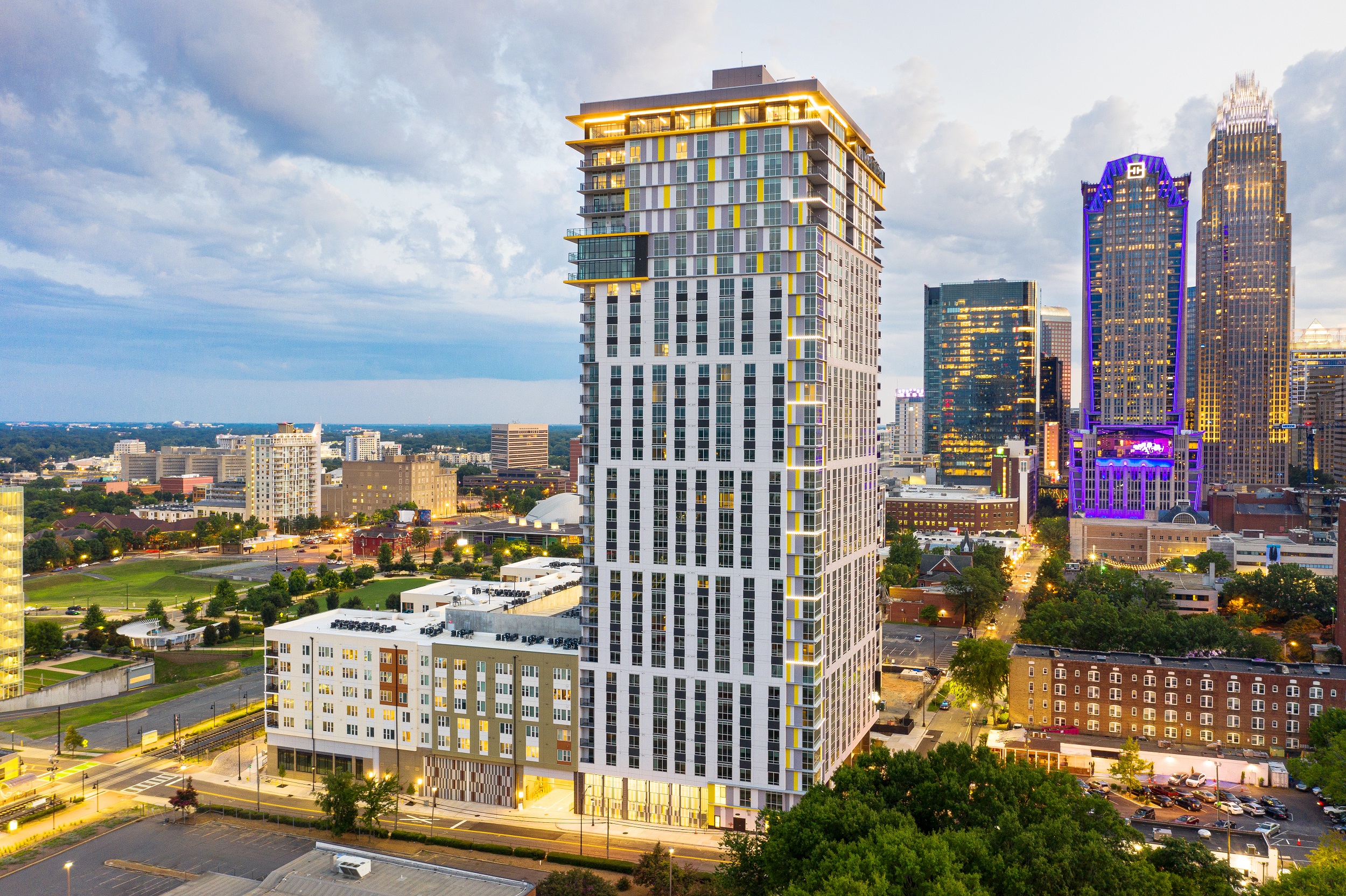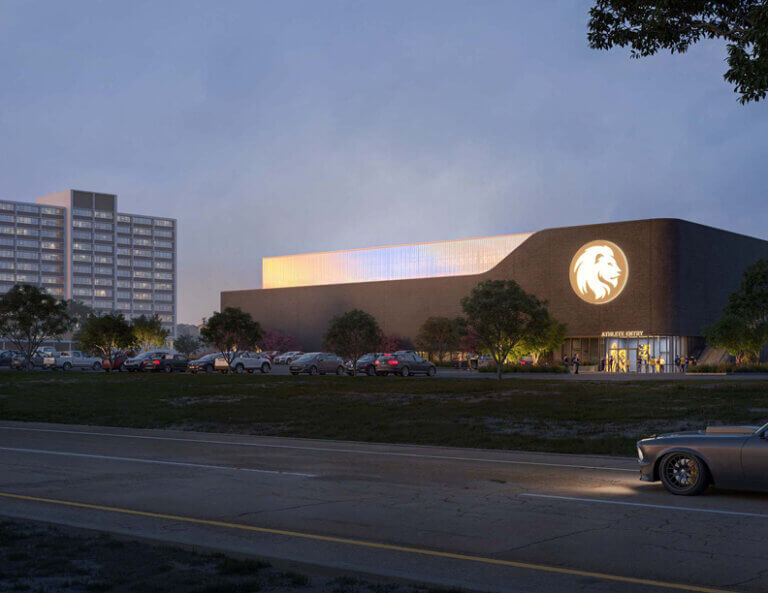
This article originally appeared in The Charlotte Observer.
Towering 385 feet above First Ward, at the corner of 8th Street and North College, sits The Ellis, uptown’s latest apartment tower. Its design, which features a yellow, gray, and white color-blocked façade and contrasting black mullions, offers a stark contrast to the blue glass towers that uptown has been known for over the past two decades.
Building a tower during normal times is never easy, and building a tower on a tightly packed construction site is even harder. Add in a once-in-a-lifetime global pandemic and things become almost impossible. I sat down with Daryl Whitehurst, a project executive at Hoar Construction, to discuss the obstacles the construction team faced with logistics, health and safety, and labor while building one of the tallest residential towers in Charlotte.
A Complicated Project on a Smaller Site
The Ellis, built in partnership with LMC, is among the most concentrated residential projects in Charlotte. The multifamily complex, housed on an approximately 3.5-acre site, is now complete and ready to lease. It includes a 33-floor main tower, featuring 365 for-rent apartment homes, a mid-rise portion with an additional 184 units wrapping a central parking structure, and 19,000 square feet of retail.
Rounding out the rest of the block will eventually be a 209-room Homewood Suites by Hilton, with 4,000 square feet of retail. This final piece of the puzzle, being developed by Concord Hospitality, stalled mid-construction this time last year.
With all these uses on a full city block, the logistics of material delivery became one of the biggest challenges of the tower’s construction. Operating within a zero-lot-line site, construction materials couldn’t linger for very long, and the team was in constant coordination with its trade partners.
“Our team faced considerable challenges during construction and still managed to execute the entire process with professionalism and efficiency, which ultimately led to a successful and on-time completion,” Whitehurst said. “I’m appreciative of both LMC and our trade partners’ collaboration and willingness to think strategically to get the job done.
The mind-blowing stats:
• 8,000 square feet of pre-waterproofed exterior façade was delivered and installed per week.
• 4,000 square feet of glass was delivered and installed per week.
• 15,000 square feet of work was completed per week.
• 256 miles of electrical wire runs through the building.
• Approximately 1.4 million linear feet of framing materials were used.
• More than 2.7 million square feet of drywall board was used.
The Covid Factor
Every construction project is unique, but the formula for completing a building stays fairly consistent. Rarely do experienced firms run into an issue that doesn’t have a precedent to look back at for solutions. When COVID-19 began to spread across the country in early 2020, there was no playbook to combat it, because there was no precedent. With construction deemed an essential industry, it was up to the local construction industry to come up with a strategy.
The early months of the pandemic raised alarm throughout the industry, early cases included a large percentage of construction workers. Aiming to combat this reality, a coalition of local and regional general contractors and inspection leaders was formed. The group, known as 4C (Charlotte Commercial Construction Coalition,) came together to tackle the best way to approach continued operation while prioritizing the health and safety of their workers. The group looked at ways to promote social distancing, enhanced PPE usage, and good worker morale.
In construction, it’s essential that workers are at ease and confident in their personal health and safety. In many cases, it’s very difficult to socially distance workers on a construction site, as plenty of tasks are a two-or-more-person job. To combat this, everyday workers were expected to follow strict PPE protocols and go through health screenings. After construction workers wrapped up for the day, a cleaning crew came in at night. Above construction elevator access points, TVs looping health and safety protocols were set up for team members to watch while they waited.
Despite all the adversity, the team pressed on and in the end proudly delivered a prominent new feature to the growing Charlotte skyline. Hoar Construction also worked with Ellinwood + Machado Structural Engineers, KTGY, Kimley Horn and Intec Group.
What Can Renters Expect?
Leasing is well under way at the Ellis, with mid-rise units at the Ellis available for move-in today. The high-rise portion will accept first move-ins later this summer. Overall, The Ellis features 549 apartment homes ranging from 531 to 2,669 square feet. Renters will experience two distinct concepts between the mid-rise and the high-rise units.
The mid-rise portion is meant for renters looking for something more eclectic and relaxed. The indoor amenity spaces are filled with common spaces to unwind, intimate seating nooks, work from home space, a fitness center, and more. The exterior amenities include a pool with cabanas, a bar overlooking First Ward Park, spaces to grill and entertain, and tons of seating to hang out al fresco. The building also faces a retail-lined woonerf dubbed North Ellis Lane, which can be closed down to host food truck rallies, farmers markets, “Small Business Saturdays” and more. Mid-rise studios start at $1,253.
The high-rise spot is meant for renters that are looking for expansive and refined modern spaces. The penthouse units I toured were among the largest and more luxurious apartments in Charlotte, some spanning nearly 2,700 square feet. The tower also has its own amenities, featuring an additional pool with cabanas, a private dining room, library, game room, and an indoor/outdoor fitness center, all with sweeping views perched 33-floors above Charlotte. High-rise units start at $1,555.
512 N. College St.

